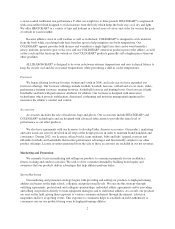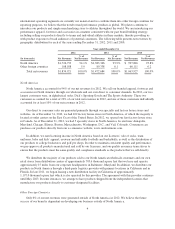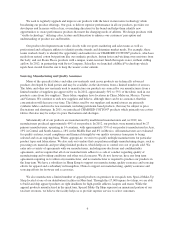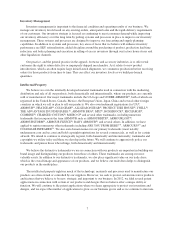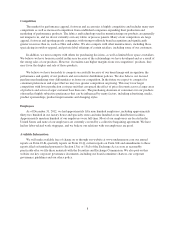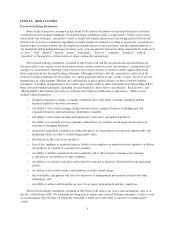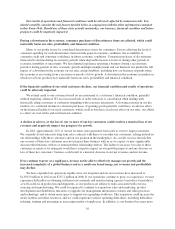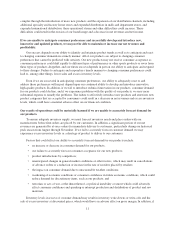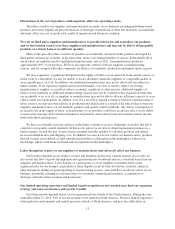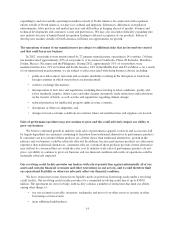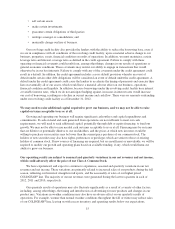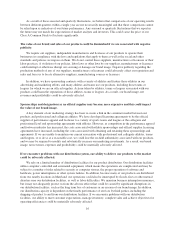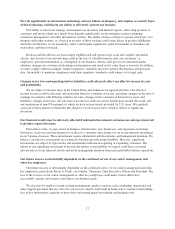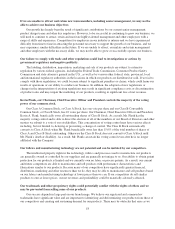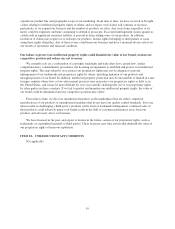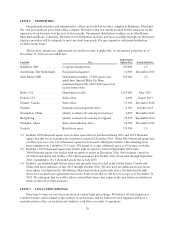Under Armour 2012 Annual Report Download - page 18
Download and view the complete annual report
Please find page 18 of the 2012 Under Armour annual report below. You can navigate through the pages in the report by either clicking on the pages listed below, or by using the keyword search tool below to find specific information within the annual report.Our results of operations and financial condition could be adversely affected by numerous risks. You
should carefully consider the risk factors detailed below in conjunction with the other information contained
in this Form 10-K. Should any of these risks actually materialize, our business, financial condition and future
prospects could be negatively impacted.
During a downturn in the economy, consumer purchases of discretionary items are affected, which could
materially harm our sales, profitability and financial condition.
Many of our products may be considered discretionary items for consumers. Factors affecting the level of
consumer spending for such discretionary items include general economic conditions, the availability of
consumer credit and consumer confidence in future economic conditions. Consumer purchases of discretionary
items tend to decline during recessionary periods when disposable income is lower or during other periods of
economic instability or uncertainty. We have limited experience operating a business during a recessionary
period or during periods of slow economic growth and high unemployment and can therefore not predict the full
impact of a downturn in the economy on our sales and profitability, including how our business responds when
the economy is recovering from a recession or periods of slow growth. A downturn in the economy in markets in
which we sell our products may materially harm our sales, profitability and financial condition.
If the financial condition of our retail customers declines, our financial condition and results of operations
could be adversely impacted.
We extend credit to our customers based on an assessment of a customer’s financial condition, generally
without requiring collateral. We face increased risk of order reduction or cancellation when dealing with
financially ailing customers or customers struggling with economic uncertainty. A slowing economy in our key
markets or a continued decline in consumer purchases of sporting goods generally could have an adverse effect
on the financial health of our retail customers, which could in turn have an adverse effect on our sales, our ability
to collect on receivables and our financial condition.
A decline in sales to, or the loss of, one or more of our key customers could result in a material loss of net
revenues and negatively impact our prospects for growth.
In 2012, approximately 22% of our net revenues were generated from sales to our two largest customers.
We currently do not enter into long term sales contracts with these or our other key customers, relying instead on
our relationships with these customers and on our position in the marketplace. As a result, we face the risk that
one or more of these key customers may not increase their business with us as we expect, or may significantly
decrease their business with us or terminate their relationship with us. The failure to increase our sales to these
customers as much as we anticipate would have a negative impact on our growth prospects and any decrease or
loss of these key customers’ business could result in a material decrease in our net revenues and net income.
If we continue to grow at a rapid pace, we may not be able to effectively manage our growth and the
increased complexity of a global business and as a result our brand image, net revenues and profitability
may decline.
We have expanded our operations rapidly since our inception and our net revenues have increased to
$1,834.9 million in 2012 from $725.2 million in 2008. If our operations continue to grow at a rapid pace, we may
experience difficulties in obtaining sufficient raw materials and manufacturing capacity to produce our products,
as well as delays in production and shipments, as our products are subject to risks associated with overseas
sourcing and manufacturing. We could be required to continue to expand our sales and marketing, product
development and distribution functions, to upgrade our management information systems and other processes
and technology, and to obtain more space to support our expanding workforce. This expansion could increase the
strain on these and other resources, and we could experience serious operating difficulties, including difficulties
in hiring, training and managing an increasing number of employees. In addition, as our business becomes more
10




